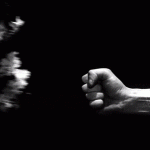Credits do not list any characters or actors, some of whom remain unknown. If you have any info please leave a reply below
un chant d’amour
‘Bravo’ (nickname; real name unknown) as the Older Prisoner was a Tunisian from nefta who was a barber with a big family to support
Lucien Sénémaud (real name) as the Younger Prisoner. He was introduced to Jean Genet by Jean Cocteau with whom he had served in the French army. Genet fell passionately in love with 18-year-old Lucien Sénémaud, about whom he wrote, “His beauty harpooned me.” The two men formed a passionate, and volatile, couple; He was a married man whose wife supported him in appearing in the film.
Java André Reybaz plays the Guard. Reybaz had a long career spanning forty years, which mostly consisted of numerous French television appearances.
Coco Le Martiniquais … Second dancing prisoner (uncredited)
Set Genet had an extensive prison set built amidst the ground floor restaurant of Nico’s Rose Rouge (the famous nightclub was in the basement). Exteriors were shot, on the sly, at both the Fresnes and La Santé prisons, where Genet had served most of the cumulative four years of his adult incarceration. The forest sequence was shot near Fontainebleu at Milly-la-Forêt, on Cocteau’s property. There is some controversy over the extent of Cocteau’s presence: Edmund White believes it was minimal, while Jonas Mekas says that Nico told him it was extensive. No one, however, doubts that the film is unquestionably Genet’s own creation. Genet’s rough cut ran 45 minutes, but he gradually trimmed it into its taut final running time of 25 minutes. (Source)
Banned When in 1966 distributor Sol Landau attempted to exhibit the film in Berkeley, California, he was informed by a member of the local police special investigations department that were he to continue screening it the film “would be confiscated and the person responsible arrested.” Landau responded by instituting the case of Landau v. Fording (1966) in which he sought to show Genet’s work without police harassment. The Alameda County Superior Court watched the film twice and declared that it “explicitly and vividly revealed acts of masturbation, oral copulation, the infamous crime against nature [a euphemism for sodomy], voyeurism, nudity, sadism, masochism and sex…” The court rejected Landau’s suit, further condemning the film as “cheap pornography calculated to promote homosexuality, perversion and morbid sex practices.” He was similarly rebuffed in the District Court of Appeal of California, which accepted that Genet was a major writer but cited this as a lesser work of an early period and declared that in the end it was “nothing more than hard-core pornography and should be banned.” When the case reached the U.S. Supreme Court, the decision was confirmed once more, in a 5-4 per curiam decision in which the justices simply stated that Un Chant d’amour was obscene and offered no further explanation. —Jonathon Green and Nicholas J Karolides, The Encyclopedia of Censorship.



